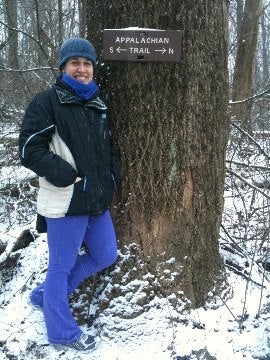- PhD Completion: august 2011 - The Effect of Risk, Time Preference, and Poverty on the Impacts of Forest Tenure Reform in China
Biography
Karen Sullivan is living the IGERT alumnus dream—living and working at the interface of science and policy in Washington, DC. Karen is currently an AAAS Science and Technology Policy Fellow hosted by the U.S. Environmental Protection Agency. The AAAS Science and Technology Policy Fellowship program offers the opportunity for accomplished scientists and engineers to participate in and contribute to the federal policymaking process while learning firsthand about the intersection of science and policy. Fellows are selected through a highly competitive peer-review process. Karen was awarded a fellowship placement in 2012 and has renewed her fellowship for a second year in the Center for Program Analysis in the Office of Solid Waste and Emergency Response. As a fellow, Karen is working as a member of several multi-disciplinary teams to quantitatively evaluate the impacts of programs and polices implemented by the Office of Solid Waste and Emergency Response (e.g., Brownfield and Land Revitalization, Superfund Program, Underground Storage Tank Program, etc.) to support the policymaking and budgetary process.
Before moving to DC, Karen spent the academic year as a visiting assistant professor at Hamilton College, where she taught a variety of courses in economics and the environment, and spent the summer at the Kripalu School of Yoga, where she completed her 200-Hour Yoga Teacher Training Program.
Karen completed her Ph.D. in Environmental and Natural Resource Economics August 2011. Her dissertation research was supported by competitively awarded funding she received from NSF’s Doctoral Dissertation Research Improvement Grant, NSF’s East Asia and Pacific Summer Institute, the Russell Sage Foundation’s Small Grant Program in Behavioral Economics and the China and Inner Asia Council of the Association for Asian Studies Small Grant. In her dissertation research, Karen examined how households’ preferences over time (present vs. future) and risk can affect their forest management responses to strengthened property rights in Fujian Province, China. Her research is unique because she links behavior she elicited in risk and time preference field experiments to actual natural resource management behavior, which few studies have previously done. Overall her dissertation research demonstrates that households’ time and risk preferences matter for forest management and responses to forest tenure reforms.
When Karen isn’t studying an EPA program or digging deep in data, you can find her at a yoga class, running a race, hiking in Shenandoah National Park, wandering through a DC museum or exploring one of Virginia’s 270 plus wineries that she was surprised to find when she moved to DC.
Selected Publications
Click here for full Curriculum Vitae.

